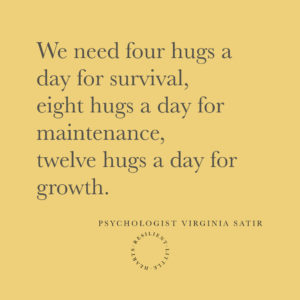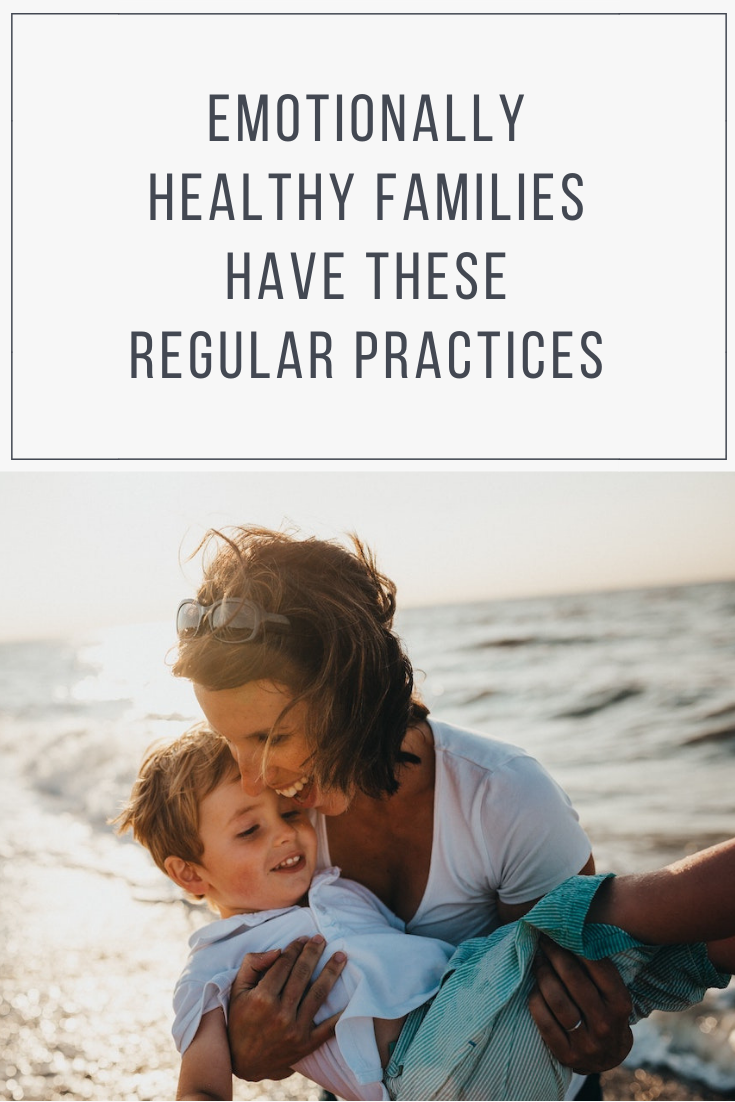Emotionally Healthy Families Have These Regular Practices
Emotional health is the byproduct of a healthy home environment.
Emotionally healthy families have specific ways of interacting & regular practices that create an environment that fuels emotional wellness.
No matter the makeup of your family unit, these regular practices are what create a healthy foundation for emotional health for everyone in the family.
It’s not about getting it perfect (or even doing these practices every single day). It is about the general trajectory of your family environment.
Our founder, Sarah Boyd says,
“Sometimes it can be easy to overlook the significance of what you’re building, because the process isn’t glamorous. It’s normal, mundane, everyday, ordinary life. But when you look back, all the ordinary days add up into something beautiful.”

EMOTIONALLY HEALTHY FAMILIES HAVE THESE REGULAR PRACTICES
Emotionally healthy families have regular daily time together to connect.
This may be a meal together, or any other type of regular family time.
Having regular rhythms of connection set as part of your family routine, ensures that on good days & bad days there is still some moment of face to face interaction with your loved ones.
Emotionally healthy individuals acknowledge & allow space for their emotions.
This means that no one gets into trouble for thinking thoughts or feeling feelings.
While there needs to be boundaries around behaviors & decisions we make with our emotions, keeping an open dialogue allows family members to have a safe place to decompress & share their feelings.
In order to cultivate a close relationship with loved ones, small regular gestures count.
Telling our family members “I love you” on a daily basis may seem trivial, because we assume that they know we love them.
But if you don’t regularly express it, how do they know?
Never assume your children “know” this if you never tell them. Even when they grow older & roll their eyes at your gesture, your regular reinforcement gives them a sense of security in their relationship with you.
Healthy physical affection is first demonstrated in families. Touch is one of the primary developmental needs of a child, & that continues throughout their life.
Make hugging one another a normal part of your family environment.
Even when you child grows older & doesn’t want you hugging them in front of their friends, make sure you continue to do it at home.
If healthy physical affection isn’t currently a part of your family environment, it can feel intimidating to start. Begin with small gestures (like a firm hand on their shoulder, or a side hug). But make the goal to embrace & hug them.
We all need more hugs from our loved ones!

Reading books together is a foundational part of healthy emotional development.
Stories help children make sense of big emotions. They also help in the development of perspective-taking & empathy which is a critical skill in building relationships.
When you read together as a family, it also adds another regular connection routine into the fabric of your home life.
Predictability gives children a sense of certainty and safety.
Emotionally healthy families have predictable weekly & daily routines.
The rules of the home are also clear & understood by every family member. This gives each family member clarity of what is & isn’t acceptable in the home.
When imperfect humans live together, there is always going to be conflict. This is a normal part of family life.
The important part is the relationship reconciliation after a conflict. This means both parties take responsibility for their actions, apologize & forgive.
Demonstrating conflict resolution will not only mend your own relationship with family members (keeping the relationship connection strong), it will also give your children a road map of how to reconcile with future relationships.
When an individual feels valued and esteemed for their unique gifts at home, they are more likely to feel confident outside of the home.
What is each one of your family members strengths or gifts? Celebrate who they are.
This also demonstrates to children that we can celebrate other people’s strengths, without de-valuing our own unique contribution to the world.
Playing and having fun together is an important practice in life.
Research shows that we feel significantly closer & connected with individuals we have played, had fun & celebrated with.
This doesn’t have to be fancy or expensive, it just needs to be something special for your family.
It could be family movie nights, or evening walks, or pancake breakfasts on the weekend. It also includes how you celebrate birthdays, & other special holidays.
Don’t allow life to go by without making the people you love feel special.
Whether this is between parents & children, spouse & spouse, or even child with child; individual time together deepens the connection between one another.
Emotional health is developed when we know we are loved.
Spending individual time together doesn’t have to be a time commitment of hours or even every day (check out our blog on Quality Time in 10mins, CLICK HERE).
But it is something that needs to happen on a regular basis, or when you begin to feel like the connection isn’t as strong as it could be.
Emotionally healthy families have open communication about their feelings, & have regular practices that develop their own emotional health & relationship connection within their family.












